How Oregon and Washington might have fooled George Kliavkoff and the Pac-12
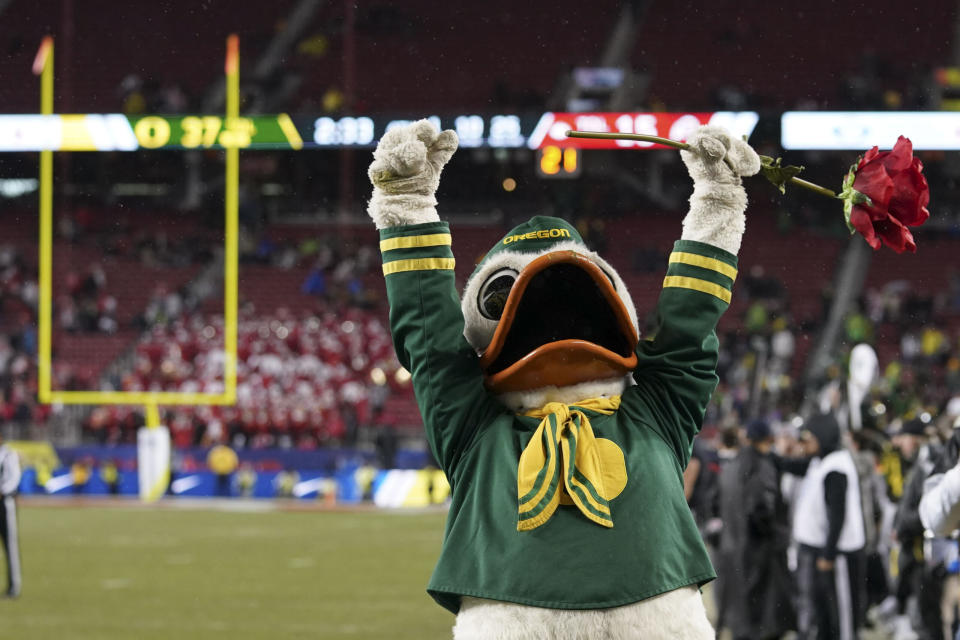
If you have lived on this planet long enough, you probably know that what people or organizations say in public does not necessarily represent or reflect what they believe or truly want in private. This begins an exploration of the relationship Oregon and Washington have to the Pac-12 Conference.
Let’s start by saying that Oregon and Washington do not hold the cards in terms of moving to the Big Ten, and that the Big Ten still does have to want them. Moreover, if you asked me right now — Friday, July 28, 2023 — which current Pac-12 schools have the most direct path to the Big Ten, I would say Stanford and Cal more than the Ducks and Huskies. I learned a lot in July of 2022, when industry insiders noted how much more Stanford would bring to the Big Ten in terms of estimated value than Oregon.
However, even if Stanford might have a more direct path to the Big Ten if the Pac-12 dies and splinters, Oregon and Washington might still be optimistic they can go to the Big Ten. We’ll explain that point and a lot more in this exploration of three-dimensional chess … and why the Pac-12, as usual, is very bad at playing it.
Let’s take a look:
IMPORTANT TWEET
At Pac-12 Media Day just 5 days ago on possible defectors:
George Kliavkoff: "It's not a concern."
Rob Mullens: "I'm not losing any sleep over that."
Either they've been caught off guard — again — or they are truly not concerned if CU (and only CU) leaves.
— Stewart Mandel (@slmandel) July 26, 2023
OREGON PERSPECTIVE

So, Oregon Athletic Director Rob Mullens wasn’t losing any sleep over Colorado going to the Big 12. Stop for a moment and think about that.
On the surface, it could be the case that Mullens and Kliavkoff were on the same page, part of a united front. It could also be the case that Oregon and Washington were sincerely invested in preserving the Pac-12. Those things could legitimately be true. Yet, they could be true in a way which doesn’t mean that much. Let’s explain:
FRAIL SINCERITY
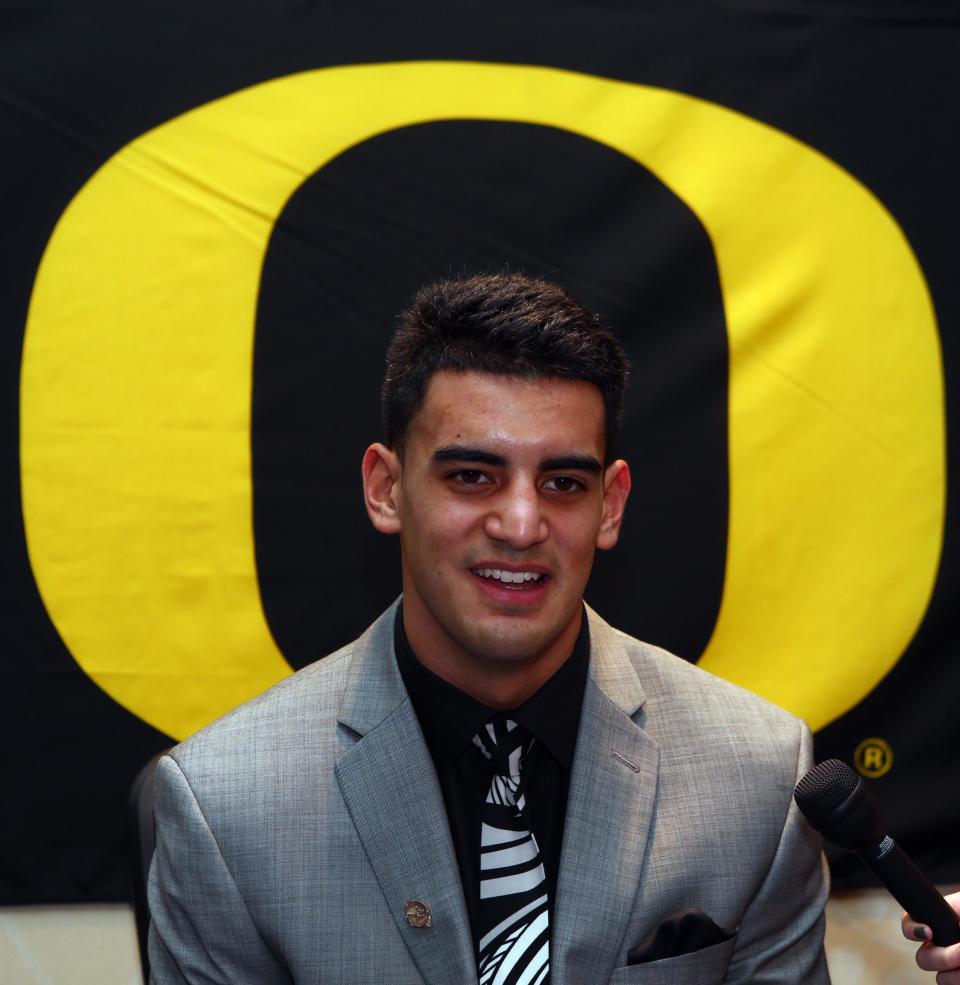
Oregon could have sincerely wanted to stay in the Pac-12, and yet, that sincerity could have been accompanied by an attitude of, “But if certain things happen, we won’t mind going to the Big Ten.” The position could be honest, but also wafer-thin and not very deep.
“We want to make the Pac-12 work for us … but if not, we won’t be devastated.”
We’re only speculating — none of this is fact — but it could certainly represent Oregon’s actual attitude to everything unfolding in the Pac-12 right now. It might also represent Washington’s view as well. Let’s play along with this hypothetical.
OREGON AND WASHINGTON: HOW THE LONG CON WORKS
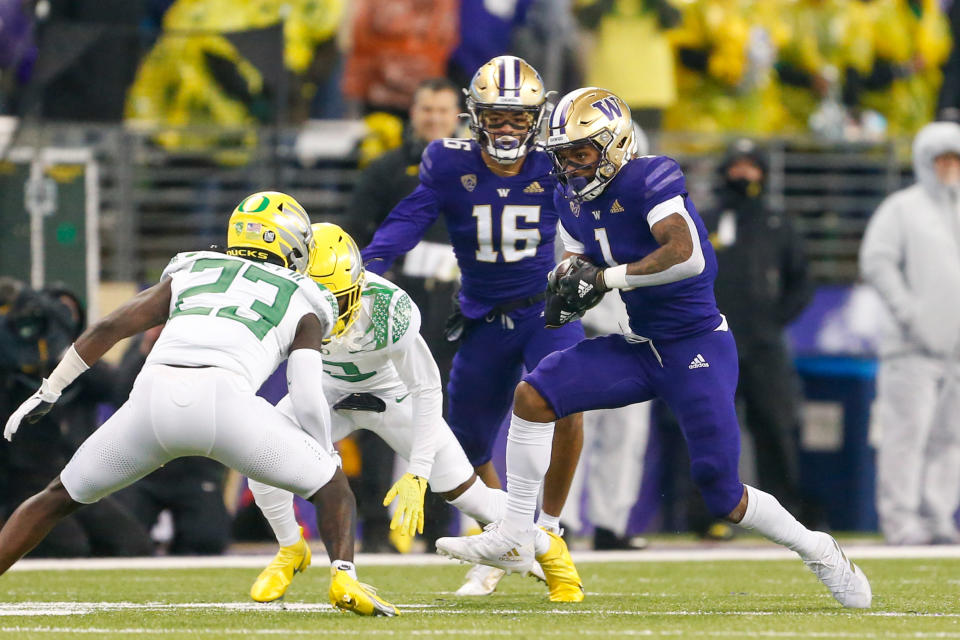
To be very clear here: We’re not accusing Oregon and Washington of doing this. We’re speculating … but we think this line of speculation contains some chess-like dimensions which are worth thinking about instead of discarding instantaneously.
Very plainly: Oregon and Washington could legitimately and honestly say they stuck around in the Pac-12 and really did want to make things work for the conference … but that if Colorado and then the Arizona schools leave, they would not be crushed or crestfallen about the death of the Pac-12.
“Welp, I guess the Big Ten will just have to scoop us up, since the Big 12 is collecting the Four Corners schools and won’t have room for us.”
Oregon and Washington administrators and leaders would never say or suggest anything like that in public, but internally and privately, that could have been their thought process all along.
Would it be that shocking if that was actually true? Again, this stuff would never be aired in public, but the point is that Oregon and Washington might have had incentives to see the Pac-12 die. George Kliavkoff’s game theory is awful because it seems he never even thought about that possibility.
It is speculation to say he never thought about that angle, but it’s not speculation to say that Kliavkoff’s game theory is bad and that he’s a terrible poker player.
BIG TEN VIEW
Spoke to Big Ten commissioner Tony Petitti today. He didn't want to speak on the Colorado situation since it's not yet official, but as far as realignment:
"What I said yesterday is still the absolutely priority. It's USC and UCLA. There's a lot of work going on to do that." pic.twitter.com/mbpvIGonrW
— Matt Fortuna (@Matt_Fortuna) July 27, 2023
BIG TEN CHESSBOARD
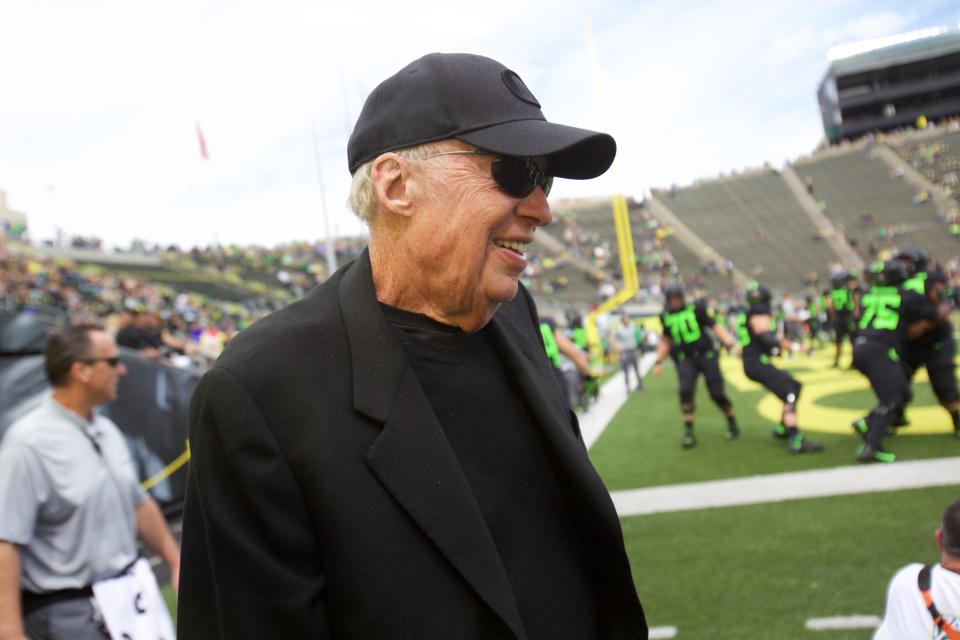
Do we realize that while the Big Ten, on its own, didn’t (doesn’t) want Oregon and Washington in the conference, the Big Ten might have to grab Oregon and Washington just because the death of the Pac-12 means a fast-track shift toward super-conferences, and that Oregon and Washington would never join the Big 12?
Phrased differently: Were Oregon and Washington secretly hoping for the demise of the Pac-12 all along, so that we all move to 20-team super-conferences in college sports and put an end to the previous model of conference membership (no Power Five conference with more than 16 schools)?
The Big Ten could add Oregon and Washington not by its own choice, but by the necessity of needing more teams in a landscape which seems destined to arrive at 20-team (maybe more) conferences sooner rather than later because of the Colorado (and then Arizona) dominoes that are falling?
The realignment cycle had supposedly stopped, but now that Colorado has initiated another round of movements — there will necessarily and inevitably be more near-term movements, at least the Big 12 adding a 14th school and the Pac-12 having to either add a team or die — we could finally be at the point where super-conferences will be formed.
If you told me Oregon and Washington privately hoped for this outcome, I would not be surprised at all.
OREGON AND WASHINGTON AS HAPPY BYSTANDERS
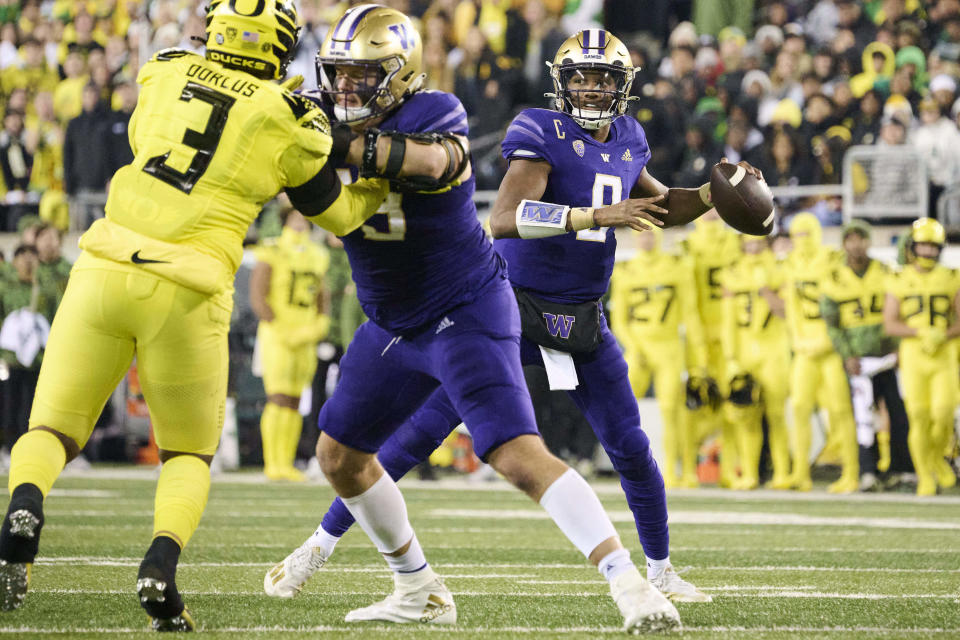
Do you realize by now how great this might potentially be for Oregon and Washington? They get to say — correctly and accurately enough — that they did not get in the way of George Kliavoff’s attempt to keep the Pac-12 together. Kliavkoff wasn’t feeling all that much urgency to get a media deal done, so it’s not as though Oregon and Washington were specifically restraining Kliavkoff and preventing him from doing what he wanted to do.
Yet, while being innocent in terms of specifically preventing Kliavkoff from saving the Pac-12, the Ducks and Huskies might have stopped short of doing everything they absolutely could to save the Pac-12.
More to the point, they might have slow-played various goals and objectives at any of the 30 Pac-12 board meetings Kliavkoff attended over the past year. They can say they promoted those goals, but privately and internally (again, this is speculation and not fact), they might not have promoted them with any urgency, because of the view that if the Pac-12 dies, a situation could open up in which UO and UW go to the Big Ten and get all that sweet TV loot.
IT'S COMPLICATED
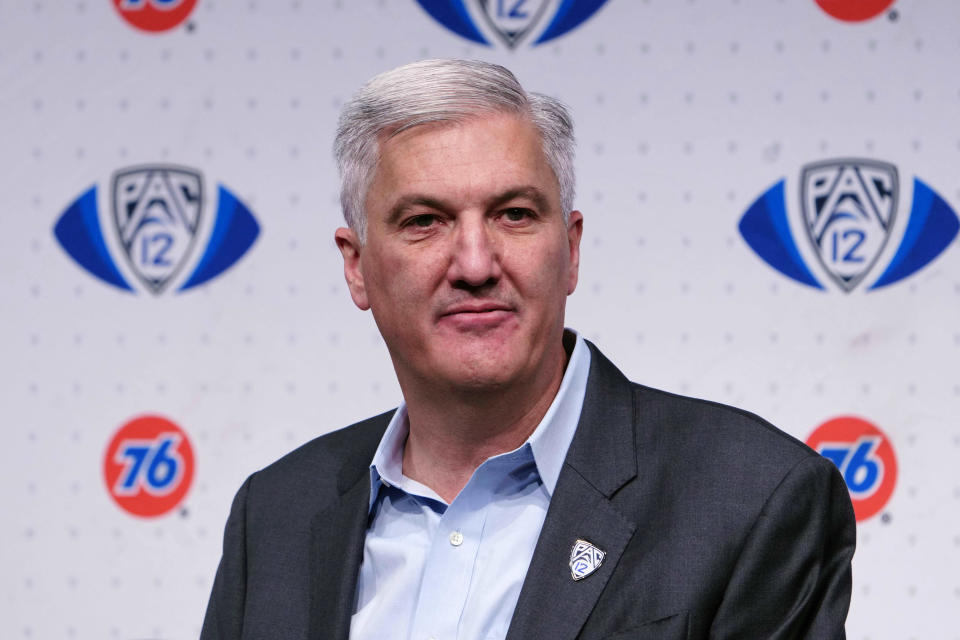
Bottom Line Number One: We’re not saying Oregon and Washington sabotaged this process, only that public statements about wanting to be in the Pac-12 — as sincere as they are or might have been — could have had very little real-world value at the negotiating table or in the larger workings of Pac-12 operations.
Bottom Line Number Two: Oregon and Washington could be completely honest in saying they wanted to stay in the Pac-12, all while privately holding the view that “if the conference dies, which is not our main desire, we do have a really attractive Plan B waiting for us.”
Our view is that UO and UW are not cursing the darkness right now, because they have a better path to the Big Ten because of the possibility that the Pac-12 will die. It’s not necessarily their dream scenario, and it’s definitely not the way in which they wanted things to play out, but they’re certainly not in a terrible position and could actually stand to benefit when the realignment wheel stops spinning. All of those things can be true at the same time.
KLIAVKOFF'S CENTRAL FAILURE
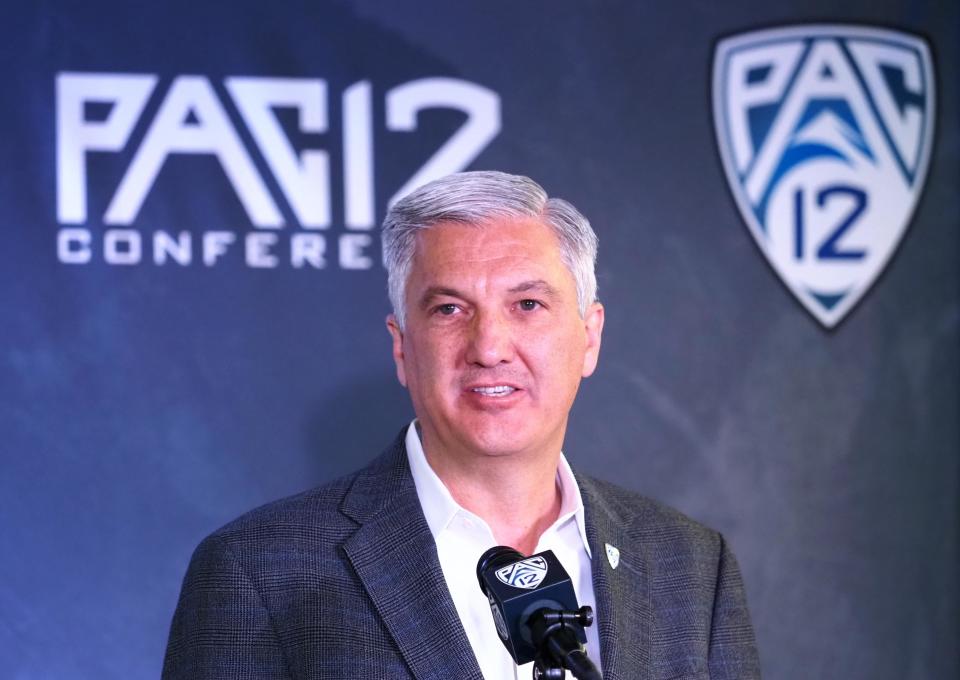
Let’s go back to the Stewart Mandel tweet above. Rob Mullens might have been perfectly sincere in feeling no pressure or worry about Colorado or any other Pac-12 school leaving the conference. Yet, underneath that public posture might lie an attitude of, “But if the conference dies, we’re not going to be crushed, since it opens up exciting opportunities for us.”
Kliavkoff never seemed to realize that the incentives for all Pac-12 schools — the urgency of seeing the conference survive — were not and are not the same.
Arizona and Arizona State aren’t invested in the Pac-12 the way Stanford, Cal, Oregon State, and Washington State are.
Utah and Colorado obviously had very different attitudes toward Pac-12 survival and staying in the conference.
Kliavkoff’s central job was to keep the Pac-12 alive and stabilize the situation until the next media rights deal was negotiated several years from now. Survival, not supremacy, was the first priority. He wasn’t supposed to get a great media deal; he was supposed to get a media deal which kept the conference together. The urgency attached to that task never really seemed evident in Kliavkoff’s modus operandi, and recent comments from Pac-12 insiders about feeling no “timeline pressure” fed into that.
CONCLUSION
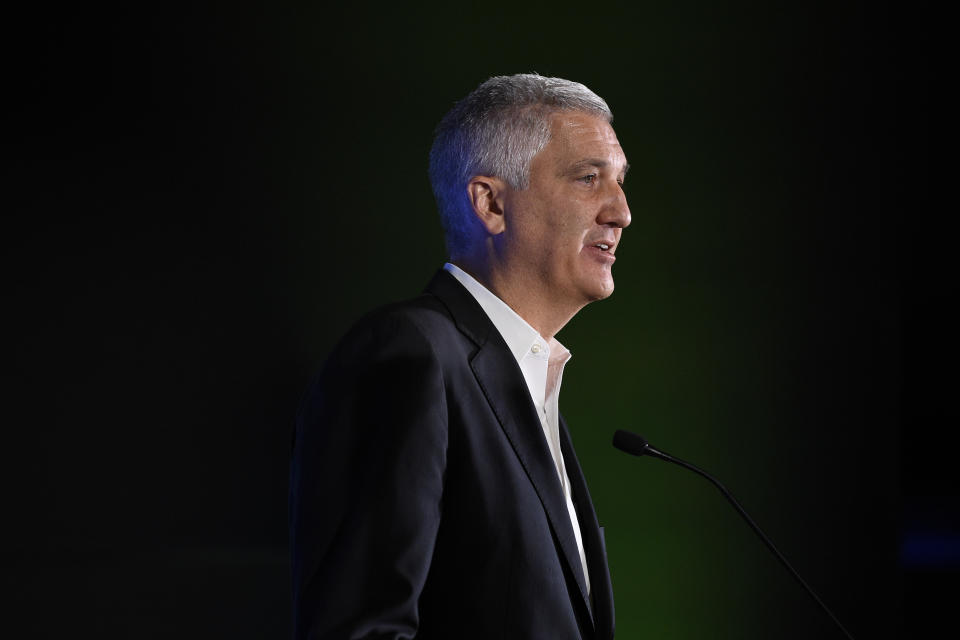
As we keep saying, Greg Sankey and the SEC have leverage in any negotiation they enter. They have power, money, stature, success, clout, you name it. They can wait out competitors. They can play a longer game and do not have to settle for the first, most reasonable offer they receive at the negotiating table.
George Kliavkoff and the Pac-12 had none of the leverage the SEC or the Big Ten have. Their focus was on survival, not supremacy. Accordingly, “settling for a deal” — if not at the ultimate/best price point — would not be a defeat, at least not if it ensured the Pac-12’s survival for the next seven years. Entities with less leverage and power necessarily have to settle for less than the ideal outcome. Their focus is on avoiding the worst outcome.
Kliavkoff, by allowing negotiations to continue, allowed for the worst outcome to remain possible. Instead of sealing a deal earlier and bringing negotiations to an end with a finalized package and a signed grant of rights plus invitations to San Diego State and SMU, Kliavkoff left the door open for the worst outcomes:
Colorado losing its last ounces of patience
The Big 12 getting its foot in the door with the Four Corners schools
Arizona and Arizona State becoming bigger flight risks due to the Colorado departure
Pac-12 survival odds decreasing
Oregon and Washington receiving Big Ten invitations not because the Big Ten truly wanted to have them, but because a slide toward super-conferences is now that much more likely in college sports
George Kliavkoff’s game theory and his calibration of priorities and first tasks was simply horrible throughout this process. That is not speculation. That’s a fact, Jack.

